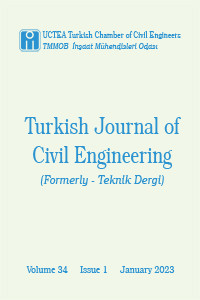Global Güneş Radyasyon Tahmini: Gaziantep Uygulaması
Global güneş radyasyonu, genetik programlama, trend analizi, LOWESS
Estimation of Global Solar Radiation: A Case Study of Gaziantep
Global solar radiation, genetic programming, trend analysis, LOWESS,
___
- Engel-Cox, J. A., Nair, N.L., Ford, J.L., Evaluation of solar and meteorological data relevant to solar energy technology performance in Malaysia, Journal of Sustainable Energy&Environment, 3, 115-124, 2012.
- Traore, S., Güven, A., New algebraic formulations of evapotranspiration extracted from Gene-Expression Programming in the tropical seasonally dry regions of West Africa, J. Irrig. Sci., 31(1), 1-10, 2013.
- Güven, A., Kişi, O., Daily pan evaporation modeling using linear genetic programming technique, Irrig. Sci, 29(2), 135-145, 2011.
- Güven, A., Kişi, O., Estimation of suspended sediment yield in natural rivers using machine-coded linear genetic programming, Wat. Resour. Manag., 25(2), 691-704, 2011.
- Kişi, O., Güven, A, A machine-code based genetic programming for suspended sediment concentration estimation , Advances in Engineering Software, 41(7-8), 939-945, 2010.
- Brameier, M., On linear genetic programming. Ph.D. thesis, University of Dortmund, 2004.
- Nordin, J.P., A Compiling Genetic Programming System that Directly Manipulates the Machine Code. In Advances in Genetic Programming, K. Kinnear, Jr. (ed.), MIT Press, Cambridge MA, 1994.
- Nordin, J.P., Francone, F., Banzhaf, W., Efficient Evolution of Machine Code for CISC Architectures Using Blocks and Homologous Crossover. In Advances in Genetic Programming 3, MIT Press, Cambridge MA., 1998.
- Ferreira, C., Gene expression programming in problem solving. In: Proceedings of the 6th online world conference on soft computing in industrial applications (invited tutorial), 2001a.
- Ferreira, Gene expression programming: a new adaptive algorithm for solving problems, Complex Syst., 13(2), 87–129, 2001b.
- Akaike, H., Information theory and an extension of the maximum likelihood principle, Proc., 2nd Int. Symp. on Information Theory, B. N. Petrov and F. Csaki, eds., Academiai Kiado, Budapest, Hungary, 267–281, 1973.
- Hersel, D.R., Hirsch, R.M., Statistical Methods in Water Resources. Studies in Environmental Science 49, New York: Elsevier, 1992.
- ISSN: 2822-6836
- Yayın Aralığı: 6
- Başlangıç: 1990
- Yayıncı: TMMOB İnşaat Mühendisleri Odası
İstanbul için Gece Parklanma Davranışları Modellemesi
Isparta Bölgesi Yağış Değerlerinin IDW ve Kriging Enterpolasyon Yöntemleri ile Tahmini
E. Dilek TAYLAN, Derya DAMÇAYIRI
Geri Dönüştürülmüş Atık Polipropilenin Bitümlü Bağlayıcılarda Kullanılması
Perviz AHMEDZADE, Alexander FAINLEIB, Taylan GÜNAY, Olga GRIGORYEVA
Akarsu Köprü Temellerindeki Oyulma Riskinin Değerlendirilmesi
A. Melih YANMAZ, Melih ÇALAMAK
Haluk AKGÜN, Mahir ADA, Mustafa Kerem KOÇKAR
